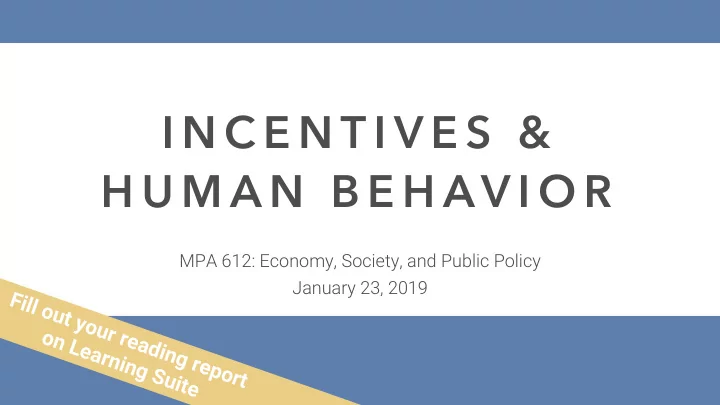

I N C E N T I V E S & H U M A N B E H AV I O R MPA 612: Economy, Society, and Public Policy January 23, 2019 Fill out your reading report on Learning Suite
P L A N F O R T O D A Y Fixing collective action problems Fun and games Heuristics and shortcuts Nudges
F I X I N G C O L L E C T I V E AC T I O N P R O B L E M S
Perfectly rational individual behavior can create irrational and inferior social outcomes
C O O P E R A T I O N I N S T A G H U N T L A N D The payoffs for cooperation are greater than the payoffs for defection There’s still an incentive to defect
W H A T S T O P S U S F R O M C O O P E R A T I N G ? Uneven payoffs Lack of assurance Preference falsification Dishonesty Selfishness These are all rational things that utility-maximizing people do!
H O W D O W E F I X T H I S ? Altruism Repetition and iteration Infinitization Punishment Institutions Norms
F U N A N D G A M E S
Go to andhs.co/quiz1 and take a quiz
Go to andhs.co/quiz2 and take a quiz
Go to andhs.co/quiz3 and take a quiz
8 × 7 × 6 × 5 × 4 × 3 × 2 × 1
1 × 2 × 3 × 4 × 5 × 6 × 7 × 8
H E U R I S T I C S A N D S H O R TC U T S
H U M A N R A T I O N A L I T Y People are rational and always maximize utility Except when they aren’t and they don’t
B O U N D E D R A T I O N A L I T Y We can’t process all information, but we can (and do!) filter and privilege information
C O M M O N H E U R I S T I C S Representativeness Availability Adjustment and anchoring Time issues
R E P R E S E N T A T I V E N E S S We make judgments based on how well information represents the norm Ignore base rates, think backwards, start with exceptions and stereotypes
R E P R E S E N T A T I V E N E S S Insensitivity to prior probability of outcomes Insensitivity to sample size Misconceptions of chance Misconceptions of regression
A V A I L A B I L I T Y We make judgments based on how quickly other examples come to mind
A V A I L A B I L I T Y Biases due to the retrievability of instances Biases of imaginability Illusory correlation
A D J U S T M E N T & A N C H O R I N G Different starting points yield estimates that are biased toward the initial values
Today Next week $100 $110 December 25, December 31, 2020 2020
T I M E I S S U E S Hyperbolic discounting We prefer immediate payoffs more than future payoffs
T H E B A T T L E W I T H I N U S Intrapersonal strategic conflict Our present selves force their preferences on our future selves Chips and salsa Saving for retirement
C O M M I T M E N T D E V I C E S Deadlines and coauthors Exercise pacts Save More Tomorrow
N U D G E S
W H A T I S A N U D G E ? Adjusting choice architecture in a way that helps people make better choices Libertarian paternalism
Why nudge? Why not nudge?
C O N D I T I O N S F O R N U D G I N G Costs now, benefits later Disconnect between costs and benefits Benefits now, costs later Choices are complex Mortgages Choices are rare Buying a car Getting married Low feedback High cholesterol diet Poor knowledge Health plans
Examples of nudges?
Recommend
More recommend